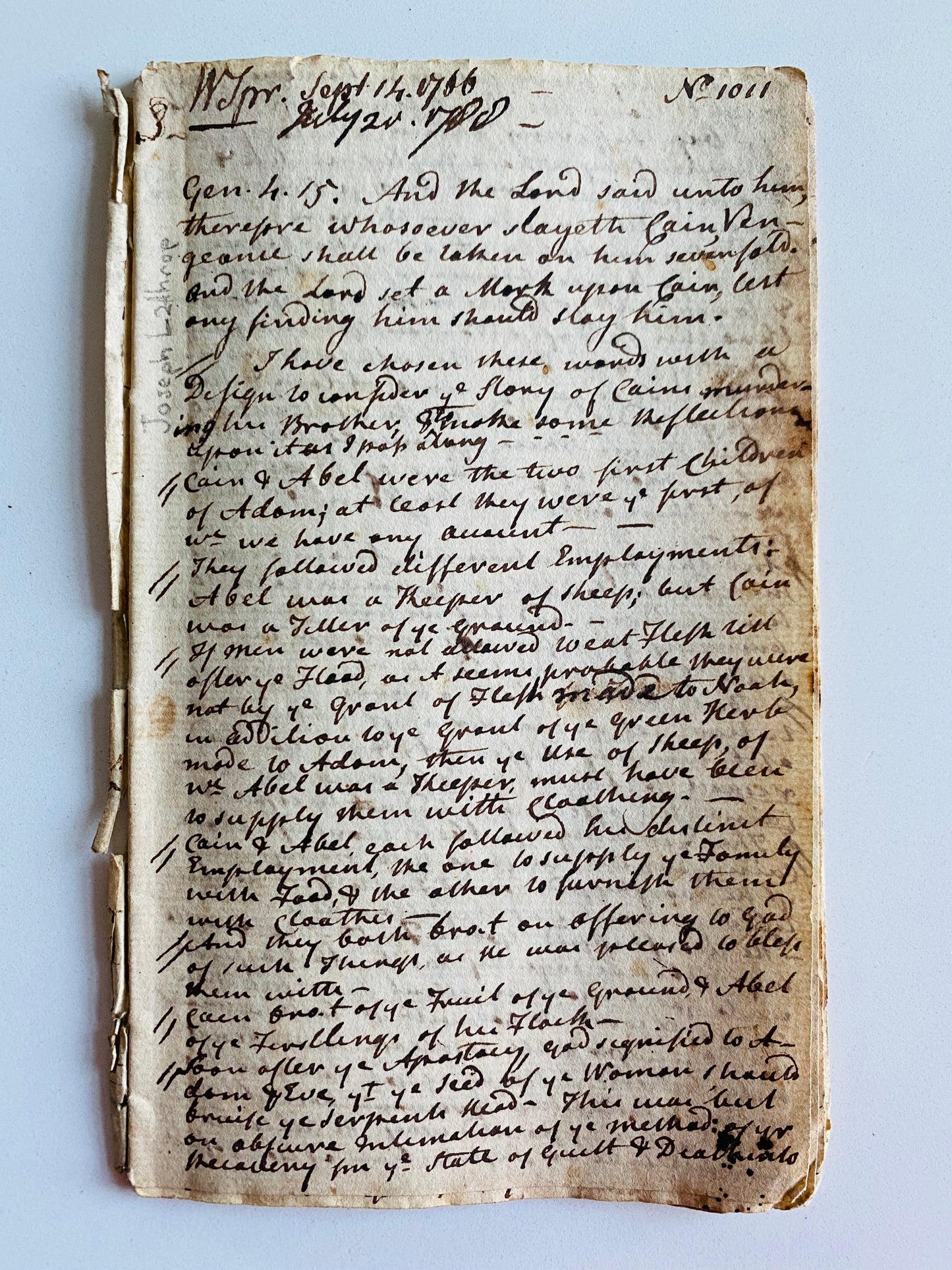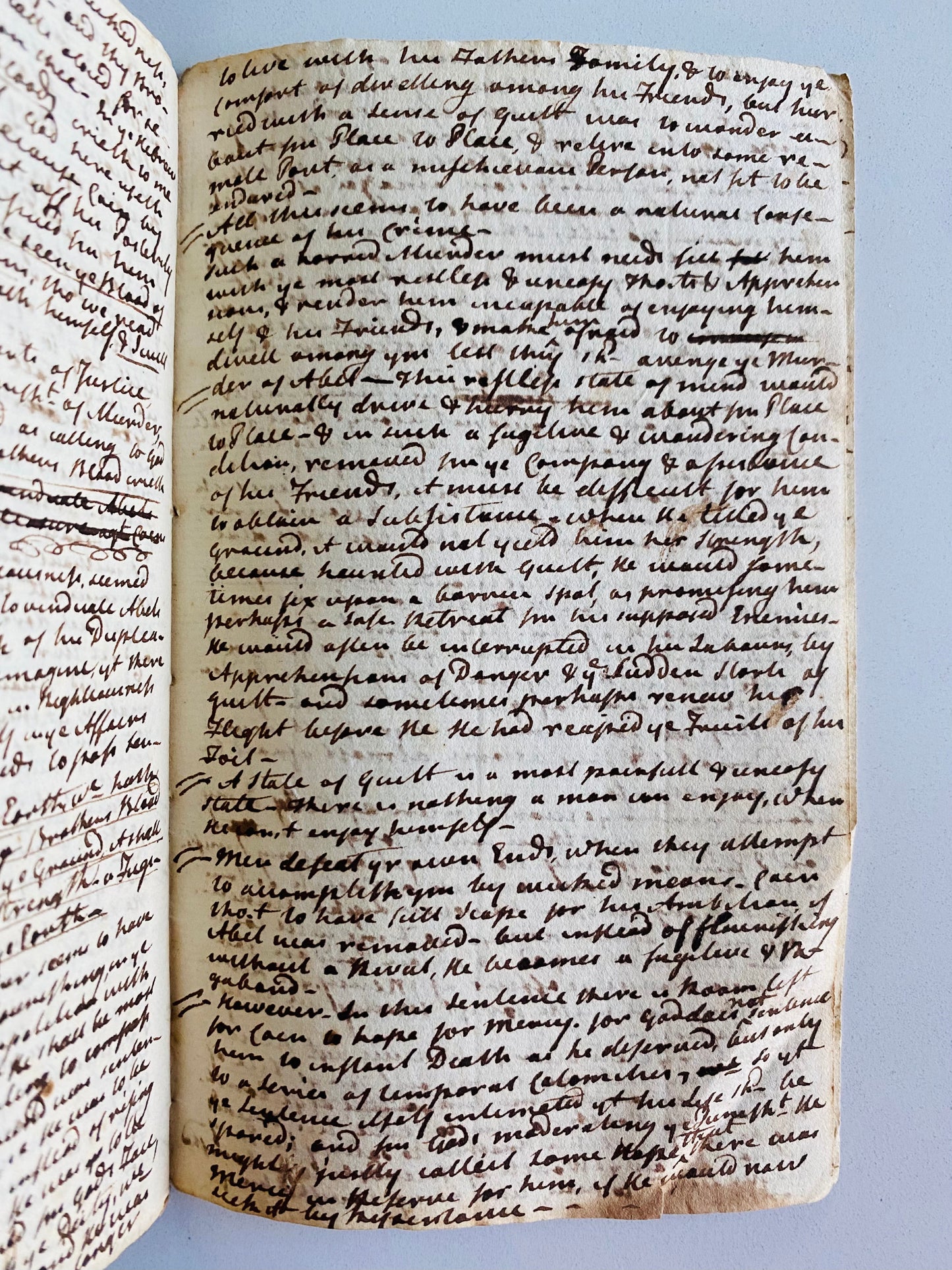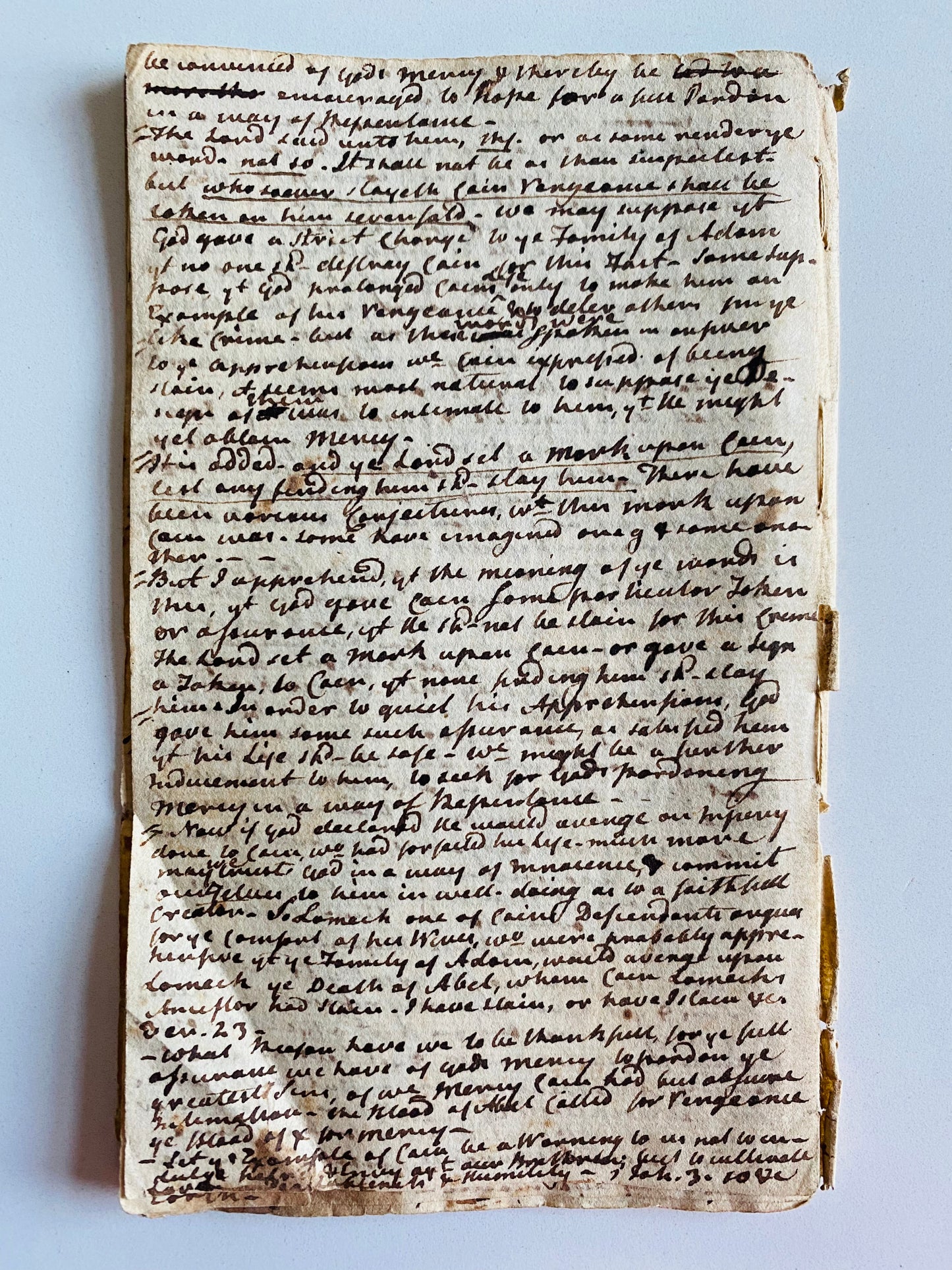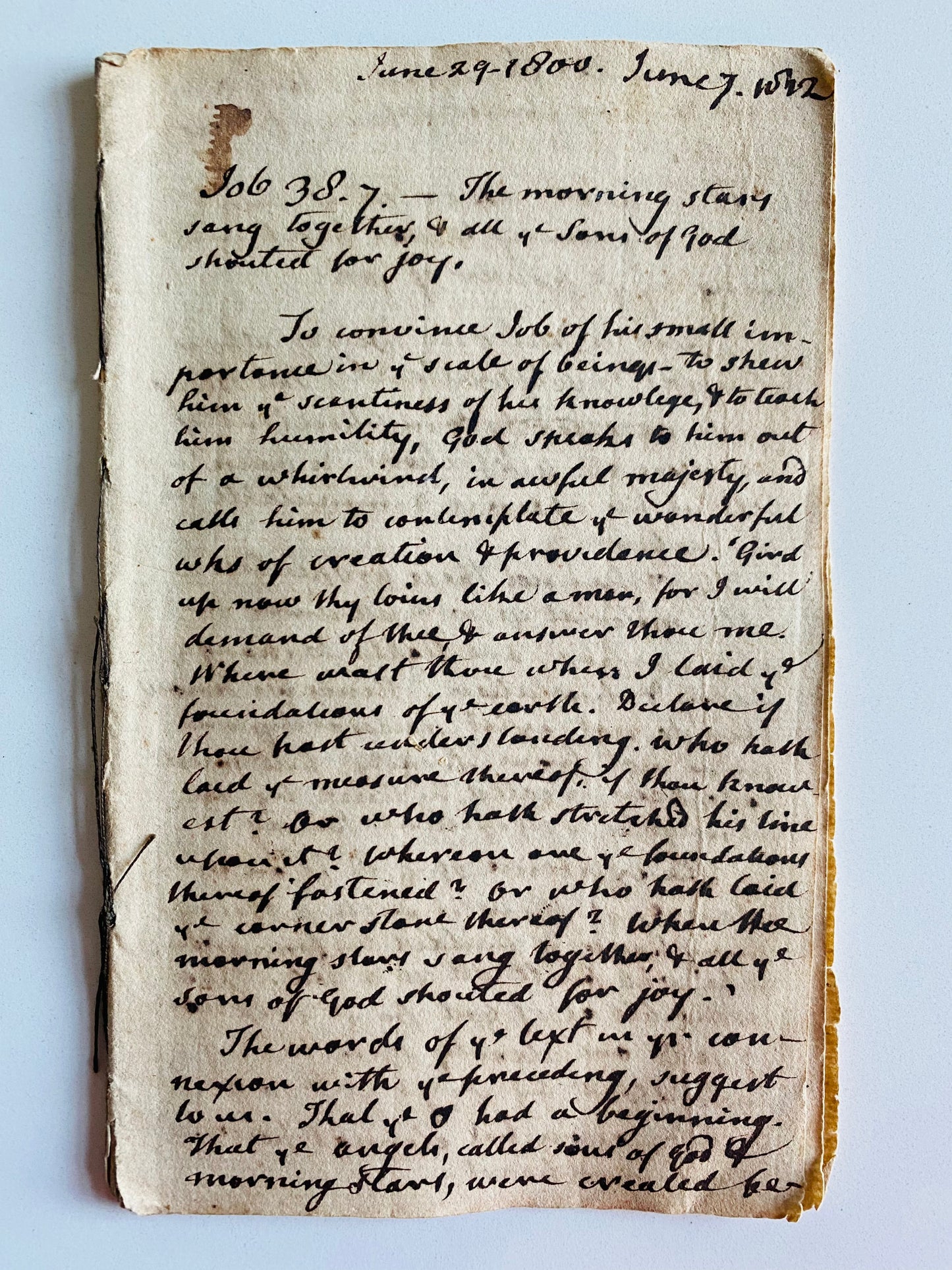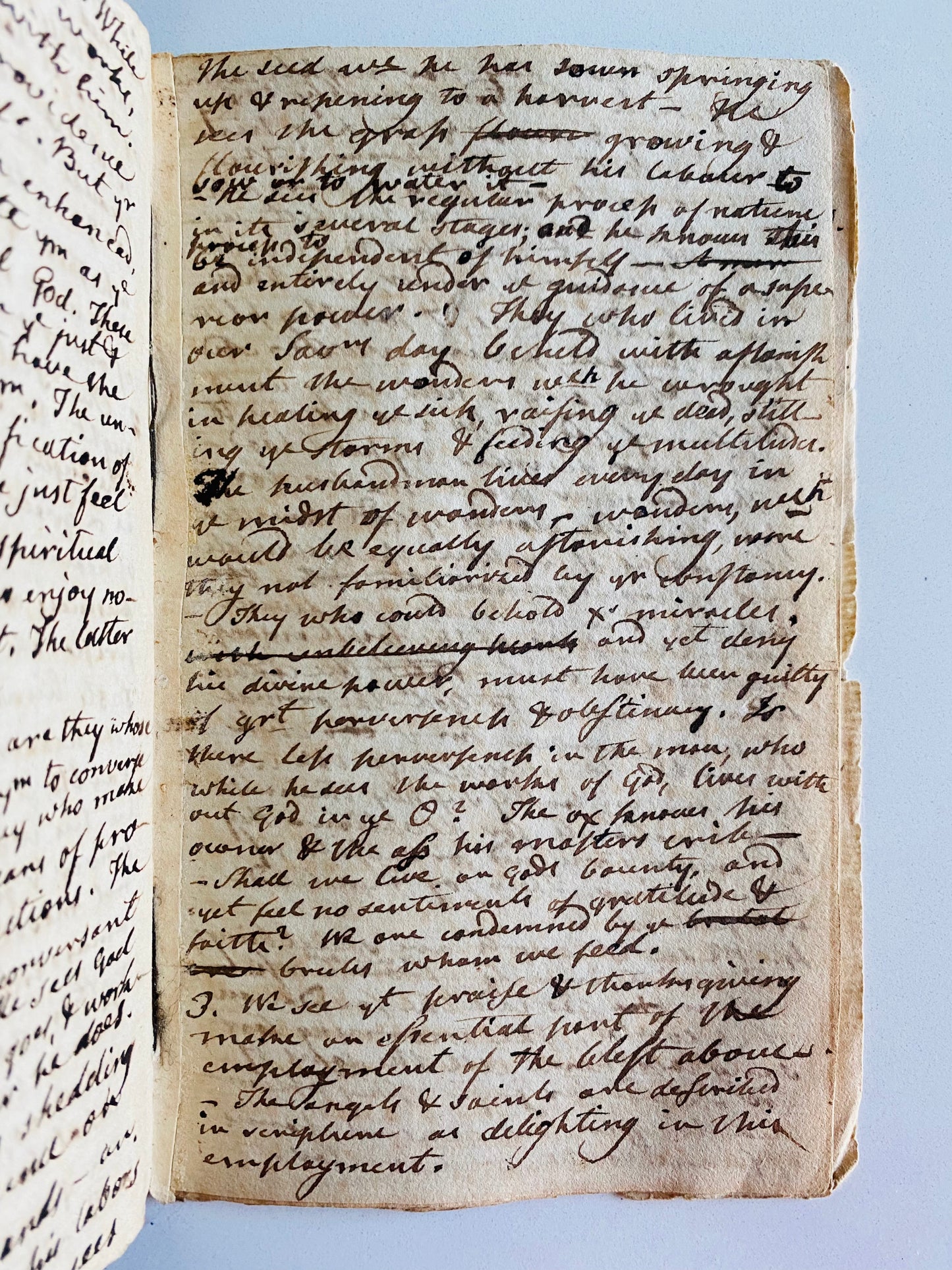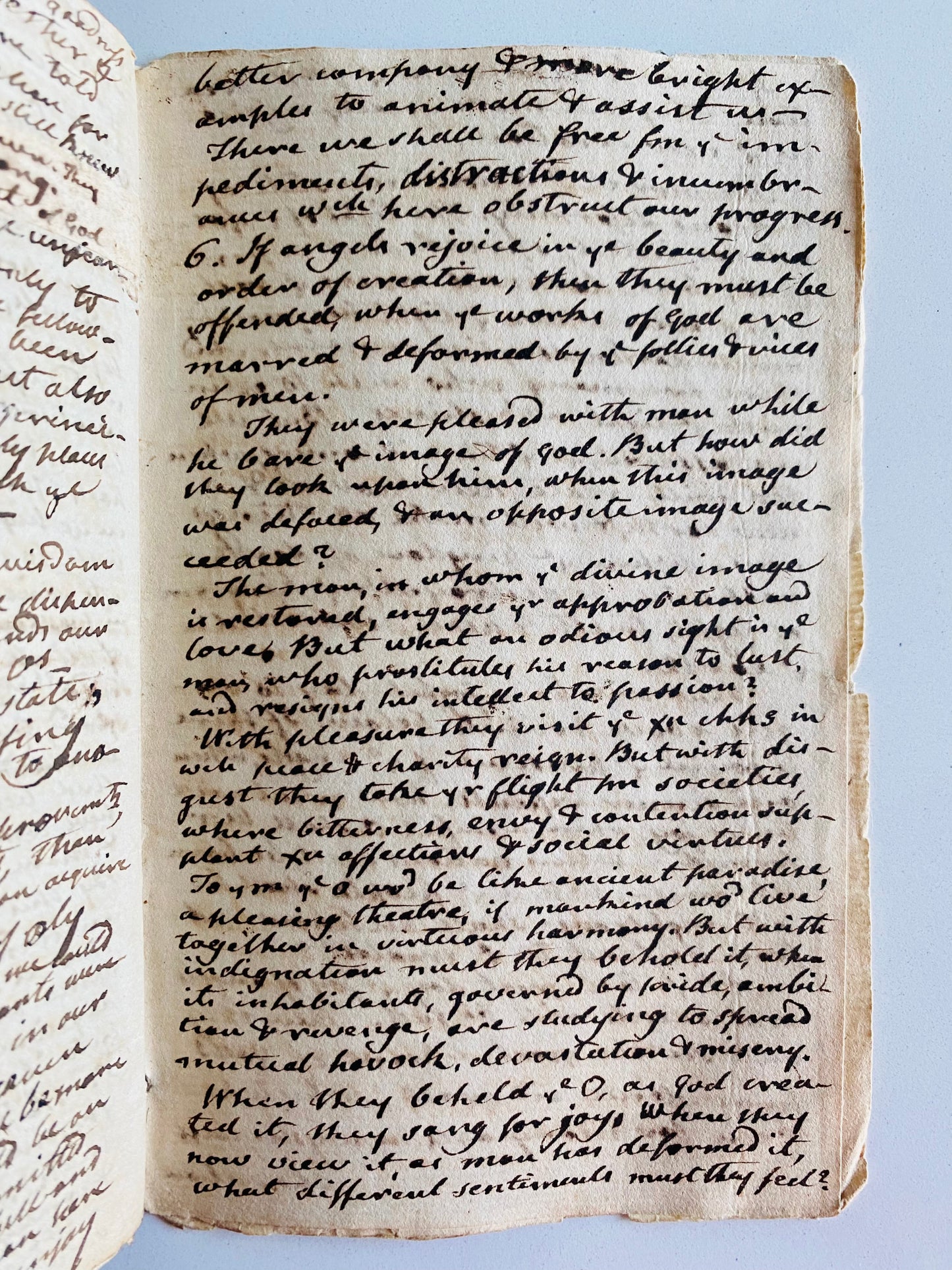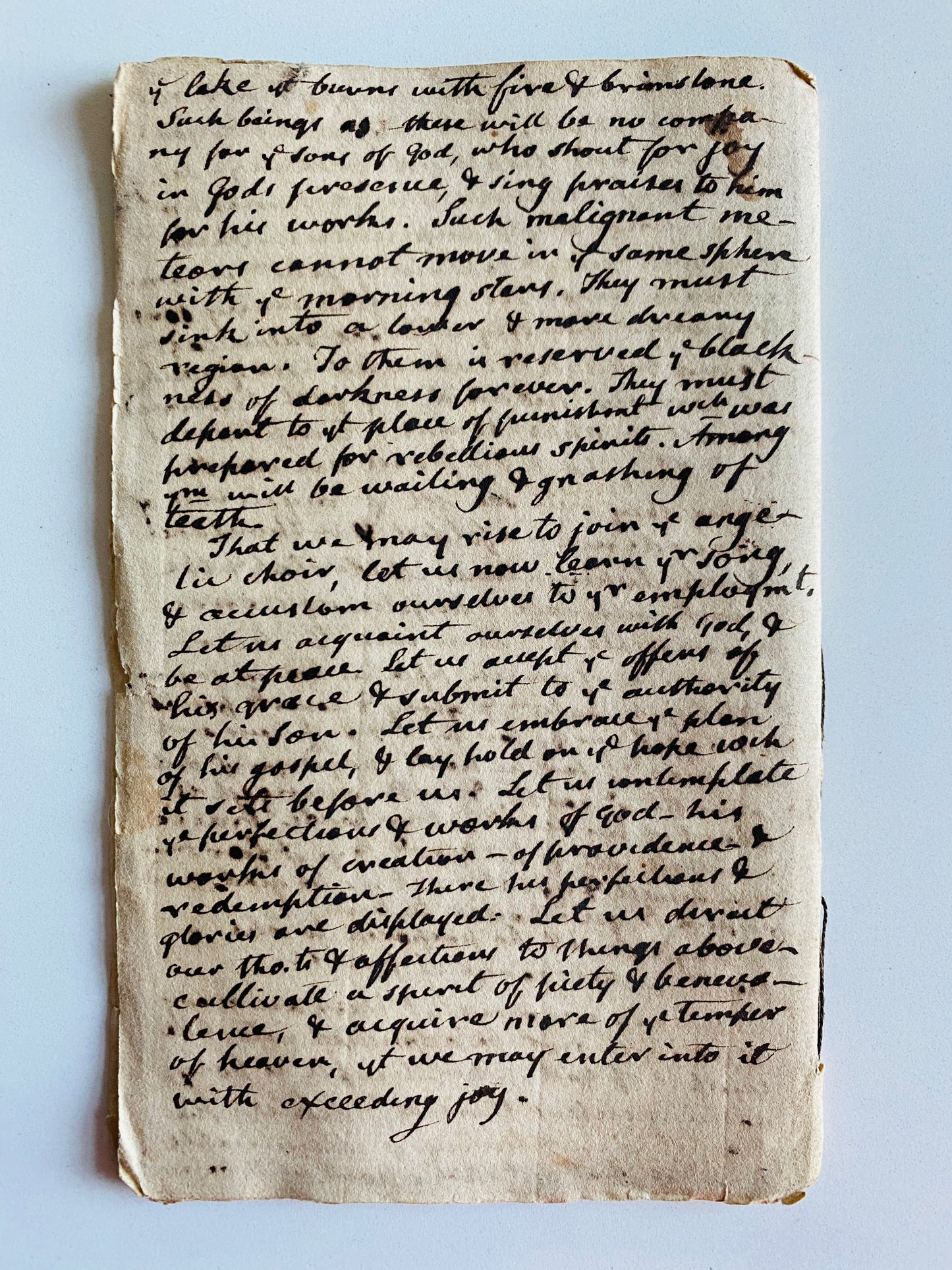Specs Fine Books
1766 JOSEPH LATHROP. 38pp Manuscript Sermon on Cain and Abel, Murder, Consequences of Sin, &c.
1766 JOSEPH LATHROP. 38pp Manuscript Sermon on Cain and Abel, Murder, Consequences of Sin, &c.
Couldn't load pickup availability
Joseph Lathrop [1731-1820] graduated Yale in 1754 and from there was ordained pastor of the Congregational church in West Springfield, where he succeeded Samuel Hopkins. He continued pastor the same flock until 1818, pastoring for over 60 consecutive years, during which time he is said to have composed in excess of 5,000 sermons for the benefit of his people.
In 1772 a controversy arose in his congregation on the subject of baptism. This led to his publication of a series of discourses in refutation of the Baptists that passed through several editions. However popular, it wasn't 100% persuasive. Not long after, his own daughter [name] married Elisha Dening Andrews who would go on to become a prominent Baptist divine. We also, as a separate offering, have manuscript sermons of his available for sale as well.
Of this Baptist controversy, we have the following account:
". . . the sky was sometimes overcast, and the waters were troubled. Evil came from without. There was at one time some fear of the spread of Baptist principles; at another a roving imposter who proved to be a wolf in sheep's clothing, like Alexander the coppersmith, threatened to do much harm in Mr. Lathrop's hitherto united fold. He was prepared for the emergency and contended earnestly for the faith once delivered to the Saints. With great plainness he instructed his people in what he believed to be the truth, and the tyranny was soon overpast. The sermons he delivered upon the latter occasion, were masterpieces of controversy, and general in their application, and at the instance of his people they were published, and soon went through some twelve editions, so great was the demand for them. Under the title of "Wolves in Sheep's Clothing" they were reprinted in Edinburgh, Scotland, and now, after nearly a hundred years they may be read with pleasure and profit."
Again, on Lathrop's pastoral fidelity.
". . . and as a faithful shepherd it was his duty to protect his flock; he was no hireling, to flee at the approach of danger. This was afterwards well illustrated during, and at the close of the war of the Revolution. The continental currency was so depreciated as to become almost worthless; the people were poor and suffered great privations. These sufferings Mr. Lathrop willingly shared. At times he was reduced to great straits for want of money; his small salary was irregularly paid and a large sum in arrears accumulated. These arrears Mr. Lathrop voluntarily forgave; when the clouds began to disappear he could not endure to see the parish struggling under the burden of a debt to himself."
. . .
"In 1793 he was offered a role as Professor in Divinity in Yale College. If he had accepted, he would have the advantages afforded by the companionship of scholars and by the college library; his salary would be doubled, and there would be a hope that he might make some provision against the infirmities of age. But none of these things moved him. Great as the temptation was, he resisted it, and said to his people, 'I shall not go; the Lord do so to me and more also, if aught but death part me and thee.'"
At 88 years of age, he took an assistant pastor. Not surprisingly, he chose well. The young man was William B. Sprague, author of the classic Lectures on Revival and the monumental Annals of the American Pulpit in 9 massive volumes.
Over his long, effective ministry, he published again and again, culminating in a series of his "Works" being issued in seven volumes between 1796 and 1821.
Additionally, he published extensively with relation to the American Revolution and the emerging independence and identity of the United States. Just to mention a pair of his important works:
1787. A Sermon On A Day Appointed For Publick Thanksgiving, Preached in Springfield, Massachusetts, Dec 14, 1787.
"Is there no case in which a people may resist government? Yes, there is one such case; and that is, when rulers usurp a power oppressive to the people, . . ."
1794. The Happiness of a Free Government, and the Means of Preserving it: Illustrated in a Sermon Delivered in West Springfield, On July 4th, 1794. In Commemoration of American Independence.
Both the above are considered landmark sermons articulating the new religio-populist environment in the aftermath of the American Revolution.
The majority of Lathrop's manuscripts appear to be safely tucked away in institutional archives. The present 18pp complete manuscript has only been preserved as it has been passed down through the family of his daughter and son-in-law.
"W.Spr. Sept. 14, 1766
July 20, 1788
Genesis 4.15. And the Lord said unto him, therefore whosoever slayeth Cain, Vengeance shall be taken on him sevenfold. And the Lord set a mark upon Cain, lest any finding him should slay him.
I have chosen these words with a design to consider ye story of Cain's murdering his Brother and to make some reflections upon it as I pass along . . .
Cain & Abel were the two first Children of Adam; at least they were ye first of wc we have any account.
They followed different employments: Abel was a keeper of sheep; but Cain was a tiller of ye ground.
If men were not allowed to eat flesh till after ye Flood, as it seems probably they were not by ye grant of flesh made to Noah, in addition to ye grant of ye green herb made to Adam, then ye use of sheep, of which Abel was keeper, must have been to supply them with clothing.
Cain & Abel each followed his distinct employment, the one to supply the family wth food & the other to furnish them with cloathes.
And they both brot an offering to God of which things as he was ****** to bless them with.
Cain brot of ye fruit of ye ground, & Abel of ye ******* of his flock.
Soon after ye Apostacy, God signified to Adam & Eve yt ye seed of ye woman should bruise ye serpents head. This was but an obscure intimation of ye method of ye recovery from ye state of guilt & death into which they were fallen. However they might learn from it, yt some of ye posterity, by suffering would obtain a victory over ye serpent by whose influence Sin & Death had been brot into ye O, & thus would procure deliverance for them.
And it is probably yt in order to preserve ye remembrance of this Promise, & to support ye Hopes in his mercy thro this seed of ye woman, God was pleased at ye **** time to institute sacrifices. It is said yt unto Adam & his wife ye land God mad Coats of Skin & cloathed them. These garments were probably made of ye skins of Beasts wc were then ordered to be slain for sacrifice.
And this Institution wc Adam received fm God, he doubtless communicated to his Children, and *** we find Cain & Abel bringing ye offering unto God, each of such things as he had.
But tho they both observed this Institution, yet ye manner of ye observance of it was very different, & thf God had respect to Abel & his offering, but unto Cain & his offering He had not respect.
The excellency of Abels worship above Cains consisted in these two things, viz yt he worshipped God in Faith, & yt He practiced ye works of Righteousness. He worshipped God in Faith. The Apostle to ye Hebrews says, by Faith Abel offered unto God a more excellent sacrifice than Cain. He came to God with yt Faith without wc it is impossible to please him. He not only believed ye Being of God, but also his Mercy & Faithfulness to receive those yt seek him in his appointed way. He believed sacrifice to be an Institution of God & offered it in obedience to him & in hope of acceptance thro yt see of ye woman, whose sacrifice was represented.
And a he brot his offering in Faith, so he also practiced ye works of Rightousness. He did not content himself with offering ye Fat of slain Beasts, but presented himself a living sacrifice, holy & acceptable to God. He did well. So God **** to Cain, if thou dost well shalt thou not be accepted? The Apostle to ye Hebrews says, By Faith Abel offered a more excellent sacrifice than Cain by wc he obtained Witness that he was righteous. His sacrifice was better than Cains, because it was offerd in Faith wc engaged him to a universal obedience. St. John also observes yt his works were righteous. Cain was of yt wicked one & slew his Brother because his own works were evil & his Brother's righteous.
Abel thus appears to have been a truely religious man. He was governed by a principle of Faith & he attended on divine Institutions & 3. maintained ye practice of Holiness. Whereas Cain had no other Religion, than wc consisted in offering to God ye Fruits of ye ground. And because Abel's sacrifice was more excellent than Cains, thf God had respect to it, & testified his acceptance of it.
The most costly offerings will avail nothing without Faith & Holiness. To obey is better than sacrifice, & to hearken than ye Fat of Rams.
What ye manner was in wc God testified his respect for Abel's offerings & his rejection of Cains, we are not told. But we find yt in after times, ye Token of approbation wc God especially gave to those whose sacrifices He accepted, was ye immediate consumption of ye sacrifices by Fire. And this no Doubt was ye sign & token given to Abel. So much at least is certain, yt God gave some distinguishing Mark of Approbation to Abel: for Cain himself could not be observe ye Preference given to his Brother's offering, wc was ye ground of his Envy & Discontent.
Let us next consider wt a base & impious temper Cain discovered upon this occasion. Instead of reflecting as he ought to have done, on his hypocrisy & wickedness, & being influenced by ye respect God manifested for Abel, to imitate his example, he was very wroth & his countenance fell. He would not brook it yt his younger Brother shd be better accepted than he wc was ye first-born & perhaps had flattered himself yt he was ye promised seed, as at least ye Father of ye promised seed, wc was to subdue ye serpent. He was very wroth. He was wroth with Abel, tho Abel had done nothing to deserved his Displeasure. He envied him ye Favorable notice yt God took of him, tho he might have enjoyed ye same Favour himself, ifhe had had ye same Relig. for Abels being accepted did not at all tend to prevent his acceptance. He was displeased with God, as if he had been unjust in giving Abel ye Preference. Envy toward [?] our Brethren for any peculiar advantages God bestows on them necessarily includes Displeasure agt God for bestowing such advantages on them. Cain would have been glad of God's Favor, could he have obtained it in his own wicked way - there are many sinners wc would chuse to be happy, but they do not chuse ye way of Holines in wc alone they can be happy.
So wroth was Cain yt his Countenance fell. He was dejected at his Brothers acceptance, as if he had himself met with some heavy affliction. That wc ought to have been matter of joy to him, was a cutting grief. His envy rose to such a height yt he could not conceal it. It discovered itself in a malicious & evil eye & in a sullen lowering aspect, wc indicated a mischievous despair.
How miserable do sinners make yourselves by ye wickedness of yr own Tempers? Envy is as Rottenness to ye Bones. It eats out all the comfort & happiness of ones life. God, seeing this envious spirit in Cain, is pleased to expostulate with him upon ye unreasonableness of it.
He first asked him, why he indulged such a Temper. Wt occasion he had for it. Why art thou wroth & why is thy countenance fallen.
God challenges him to justify his Discontent, to assign any sufficient reason why he shd **** of ***** on account of ye gracious notice He had taken of Abel.
Here we have an instance of God's condescension. he allows Cain to come & reason with him & shew wherein He had been ill-used. Cain had mocked with ye empty form of Worship and then God signified to him his holy disapprobation of it in order to his conviction and amendment. Instead of making any reflections on himself, he is angry with God for rejecting his vile hypocrisy & enraged abt his Brother because God [had] given him ye preference. Who would have thot there could have been so much wickedness in ye Heart of man, in yt early age. And wo would have imagined yt God shd any longer spare such an insolent provoking offender. But yet he condescends to come to a Treaty with him & bids him make his complaint, & shew wherein he had been injured. Why art thou wroth. In ye same condescending manner God sometimes treatied with his rebellious People ye Jews. Wt iniquity says he, have your Fathers found in me, yt they are gone far frm me. Have I been a wilderness unto Israel, a Land of Darkness? Wherefore say my people we will come no more unto thee? come now & let us reason together.
Yea God not only allows Cain to justify his Discontent if he can, but he condescends to vindicate to Cain his own conduct in preferring his Brother, yt he might convince him he had no cause to complain. If thou doest well shalt thou not be accepted, but if not sin lieth at ye Door.
God here signifies, yt something more, than sacrifice is necessary to acceptance with him. Cain had brot his Offering as well as Abel: yet that was not enf to procure his acceptance - And God ***** it to Cain himself to judge whether obedience shd not be added to sacrifice - If thou dost well shalt thou not be accepted - but if thou does not well - if thou workest wickedness all thy sacrifice will not expiate thy guilt, for sin lieth at ye Door. Surely you cant imagine yt I shall be so pleased with ye offerings you bring me as hereby to be induced to overlook your known willful sins. If you would be accepted, you must, with your offerings, join Repentance & Obedience.
Again. God here demands of him whether wn not obviously just & right, yt wo does well shld be accepted rather than one wo does ill - If thou doest well shlt thou not be accepted? Suppose you had done well & your Brother ill, shd not you think you ought rather to be accepte than he, and if so then one wc has done better than you ought in some respect to be preferred befor eyou. God here teaches him, yt he acts impartially & without respect of Persons. Yt he regards men, not according to any external circumstances of Birth, Employment, Wealthy, or Power in wc one may differ fm & have advantage above another, but according to ye real characters. Yt he loves Righteousness & true Goodness in whomever he finds it, & will accept & reward ye sincere & upright man wtever his station or condition may be. Yt Cains being ye Elder Son shd not intitle him to ye divine Favor in a way of wickedness nor Abels being ye younger exclude him fm it if he did well."
. . .
"And now thou art cursed fm ye Earth wc hath opened her Mouth to receive thy Brothers Blood fm thing hand. When thou tillest ye Ground it shall not henceforth yield thee her Strength - a Fugitive & Vagabond shalt thou be in ye Earth.
Cains sin in killing his Brother seems to have been to make himself great & flourishing in ye O without any one to stand in competition with him. But God lets him know, yt He shall be most woefully disappointed for attempting to compose his design so wickedly. The Ground was sentenced to not yield him her Strength, ie He was to be unprosperous in his Tillage. And instead of rising in God's Favor without a Rival he was to be banished fm his native Home & hid from Gods Face, & no longer enjoy the Converse with ye Deity, wc these first ages were blessed with - and He was to be a fugitive and a vagabond. He was no longer to live with his Fathers Family & to enjoy ye comfort of dwelling among his Friends, but hurried with a sense of guilt was to wander about from place to place & reture into some **** **** as a mischievous person not fit to be endured.
All this seems to have been a natural consequence of his crimes. Such a horrid Murder must needs fill him with ye most restless & uneasy thots & apprehensions & render him incapable of enjoying himself & his Friends, & make him afraid to dwell among ym lest they ind avenge the Murder of Abel. This restless state of mind would naturally drive & hurry him about fm Place to Place - & in such a fugitive & wandering Condition, removed fm ye company & assurance of his Friends, it must be difficult for him to obtain a subsistence. When he tilled ye ground, it would not yield him her strength because haunted with guilt, he would sometimes fix upon a barren spot, as promising him perhaps a safe Retreat fm his supposed Enemies. He would often be interrupted in his labours by Apprehensions of Danger & ye Sudden spark of guilt. And sometimes perhaps renew his Flight before he had reaped ye Fruits of his Toil.
A state of Guilt is a most painfull & uneasy state. There is nothing a man can enjoy when he cant enjoy himself.
Men defeat their own ends when they attempt to accomplish ym by wicked means. Cain thot to have still hope for his ambition if Abel was removed, but instead of flourishing without a Rival, he becomes a fugitive & Vagabond."
&c. &c. &c.
Apparently complete, ending with a sequence of five applications.
Accompanied by another similar by Joseph Lathrop on Job 38.7, preached June 29, 1800, 20pp complete.
Share
